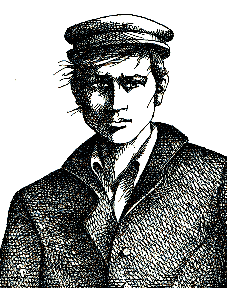Two things before we begin:
- Let us talk about author's intent for a moment.
- I hate Toni Morrison.
(Those two are related I swear.)
You see it started in high school.(There it is)
And we were reading Beloved.
(Probably one of the most beautiful and devastating reads of my young life)
We were discussing it in our pseudo-critical way that high schoolers get.And somebody asked the question.
The immortal question.
The question that has haunted me since my earliest days as an artist, a student, and a god damn human being interested in books and shit:
What did the Author intend?Variations:
What did the Author want?
Is that what the Author meant?Invariably this turns into an "I don't know"/Pontius Pilate/wash my hands/ as quickly as possible and move on with the discussion.
But not this day.
Not with Beloved.
Why?
It is in the Introduction.
You heard me.
The Author's intent is in the Introduction.
Now, I am sure that if I go back and re-read it, it won't be as bad as I remember.
But, I remember it badly.
In the Introduction of Beloved (one of the best of books) Toni Morrison systematically explains to the audience:
- the meaning
- the symbolism
- what she was doing at every moment in every chapter.
I was dumbfounded.
This had never happened before.
Imagine if there were Spark's Notes to Shakespeare's plays written by Shakespeare.
"Writing Hamlet wasn't good enough, best give them the run down"
-Will Shakesman 1606So that was what happened.
Somebody asked (I blame you Nathaniel!) the question (shudders).
Our teacher pointed out the Introduction.
We read it for the next twenty minutes.
Every one put the book down.
What happened after that?
Well, it started like this:
And it went to this:
(Thank you, miss)
All discussion stopped.
Nobody felt good anymore.
We sort of sat there till the bell.
Why?
Because we knew what the Author meant...
Because that seems to be the biggest, most glaring question in any critical or artistic debate:
What did the Author intend?Fuck if I know!
Fuck if I care!
Is my battle cry.
Because of that discussion.
Because of Toni Morrison.
In that moment I realized that all I had learned up until that point in classroom debating was to suss out what the Author meant.
That is all any of us had learned.
And Toni Morrison, bless her wicked pen, gave us exactly that.
We never stood a chance.
So I beg you, I implore you, don't be content with what the Author meant.
The Author told you something with their Art.
That is what they meant.
It is up to you to find/create meaning.
Here are some ways to do that:
1. Ask questions that are audience-centric:
- What did I think this meant?
- What did you think this meant?
- What was meaningful?
- What symbols helped create meaning?
- What makes this work important?
- to me?
- to us?
- to our community?
- to our world community?
- to today?
- What does it say about the "real" world?
- What does it say about the way the world ought to be?
- How does this manifest from the struggle/conflict?
3. Ask questions about the form:
- Was this the best way to present the artwork?
- Are there others? Movies. Plays, Cartoons. Novels. Letters. Graphic Novel. Music. Dance. Opera.
- If so, what?
- If so, what was better? Best?
- If not, why not?
- If not, could it be made into others?
- The story is told from a certain perspective. Whose?
- Could it be told differently?
- Whose story should/could it be?
- Would it change the story?
- Would it change the outcome? (there is an idea. Would villains be villains if we cared about them like heroes?)
The story can exist outside of the Author's intent.
In fact, I believe that it does.
By asking these sorts of questions it no longer puts the emphasis and the strain on a single person's limited artistic/mental skills.
Instead, hopefully, it unpacks the story by saying, here is a limited view of a whole world from a certain author's perspective.
Just look at such delightful re-imaginings of Jane Austen as
And (not so popular):
What if a classic world were suddenly populated by such creatures?
Who is to say it wasn't?
Maybe good old' Jane Austen glossed over the whole zombie infestation because it wasn't particularly British.

